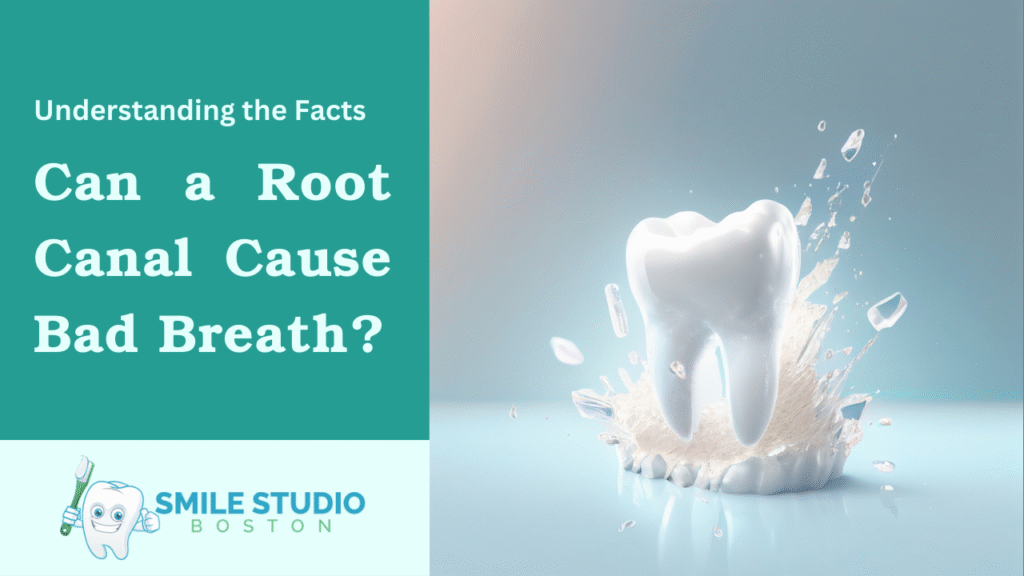A root canal is a common dental procedure to save a severely decayed or infected tooth. While the treatment is effective in eliminating pain and preventing tooth loss, some people experience bad breath after root canal. This can be concerning and may indicate an underlying issue.
If you’ve noticed a persistent odor in your mouth, you may wonder: Can a root canal cause bad breath? In this blog, we will explore the possible reasons behind bad breath after root canal, its causes, prevention methods, and when to see a dentist for help.
Read More: Root Canal Infection Years Later: Symptoms, Risks, and Treatment
I. Can a Root Canal Cause Bad Breath?
A root canal removes infected pulp and seals the tooth to prevent further bacterial growth. However, in some cases, bad breath after root canal. But does a root canal cause bad breath directly? Not necessarily. The procedure itself is meant to remove infection, but if bacteria remain trapped or the tooth is not properly sealed, it can lead to an unpleasant smell.
Additionally, if a root canal tooth smells rotten, it could be a sign of reinfection or improper healing. Understanding the reasons behind post-root canal bad breath is essential to addressing the problem effectively.
Read More: 6 Signs You Need a Root Canal and What to Do Next
II. Common Causes of Bad Breath After Root Canal
If you are dealing with bad breath after root canal, several factors may be at play:
1. Residual Infection: If bacteria remain in the tooth or surrounding area, they can continue to multiply, leading to bad breath.
2. Poor Oral Hygiene: Failing to brush and floss properly can allow food particles to get trapped around the treated tooth, leading to odor.
3. Tooth Restoration Issues: If the filling or crown is not sealed correctly, bacteria can enter the space and cause an infection.
4. Dry Mouth (Xerostomia): A decrease in saliva flow can make it easier for bacteria to grow, leading to persistent bad breath after root canal.
If you notice a root canal tooth smells rotten, it’s essential to consult your dentist to rule out any lingering infection or complications.
Read More: Back Molar Extraction: Procedure, Recovery, and Cost
III. How to Prevent Bad Breath After Root Canal
Preventing bad breath after root canal involves good oral hygiene and proper post-treatment care. Here are some essential tips:
1. Maintain good oral hygiene by brushing twice a day, floss daily, and use an antibacterial mouthwash to eliminate odor-causing bacteria.
2. Stay hydrated by drinking plenty of water helps maintain saliva production, preventing dry mouth and bacterial growth.
3. Regular dental visits and check-ups allow your dentist to monitor the treated tooth and ensure there is no reinfection.
4. Choose proper diet choices by avoiding foods that contribute to bad breath, such as garlic, onions, and sugary snacks that promote bacterial growth.
By following these preventive steps, you can minimize the risk of experiencing bad breath after root canal and keep your mouth healthy.
Read More: Financial Considerations: Tooth Extraction Vs Root Canal Cost
IV. When to See a Dentist
Persistent bad breath after root canal could indicate a problem that requires professional attention. Consider seeing a dentist if you experience the following:
- A foul smell from the treated tooth that doesn’t go away
- Pain or swelling near the root canal site
- Pus discharge or an unpleasant taste in your mouth
- Signs of infection, such as fever or gum inflammation
If you’re wondering if a root canal causes bad breath, the answer is no. While it shouldn’t, complications can arise that contribute to odor. Your dentist can assess the situation and provide solutions such as retreatment or medication to resolve any lingering infection.
Read More: Root Canal vs. Extraction: Which Option Is Best for You?
Final Thoughts
While a root canal is designed to remove infection and preserve your tooth, bad breath can sometimes occur due to underlying issues. Whether caused by a failed seal, poor hygiene, or an unnoticed infection, addressing the problem early is key.
If you notice bad breath after root canal, don’t ignore it—seek professional dental care.
Transform Your Smile Today with SmileStudio!
At SmileStudio, we believe everyone deserves a smile they’re proud to share. Whether you need routine dental care, cosmetic enhancements, or advanced treatments, our expert team is here to guide you every step of the way.
Why Choose SmileStudio?
✅ Expert Team – Our top-rated crown dentists, implant dentists, and veneer dentists provide the highest standard of care.
✅ Flexible Payment Options: We offer affordable payment plans to ensure everyone has access to quality dental care.
✅ Emergency Dental Care: Get immediate care when you need it most with our emergency dentist services.
✅ Walk-In Appointments: Our walk-in-accepted dental office makes it easy to fit dental care into your busy schedule.
✅ MassHealth Accepted: We’re a dentist that accepts MassHealth, making dental care accessible to all.
Take the First Step Toward a Brighter Smile!
📞 Call Us: +1 (617) 265-5606
📧 Email Us: smilestudioboston@gmail.com
🌐 Visit Our Website: smilestudioboston.com
📍 Find Us: 1428 Dorchester Ave, Dorchester, MA 02122, United States
✨ SmileStudio – Where Beautiful Smiles Begin! ✨

FAQs
Q. Can a root canal cause bad breath permanently?
No, bad breath after a root canal is usually temporary and can be managed with proper oral hygiene and dental care.
Q. Why does my root canal tooth smell rotten?
A foul odor may indicate a lingering infection, decayed tooth material, or a poorly sealed filling trapping bacteria.
Q. How do I get rid of bad breath after a root canal?
Maintain good oral hygiene, stay hydrated, use antibacterial mouthwash, and visit your dentist for regular checkups.
Q. Does a failed root canal cause bad breath?
Yes, a failed root canal can lead to infection, abscess formation, and persistent bad breath due to trapped bacteria.
Q. When should I see a dentist for bad breath after a root canal?
If bad breath persists for weeks, is accompanied by pain or swelling, or worsens over time, consult your dentist immediately.


